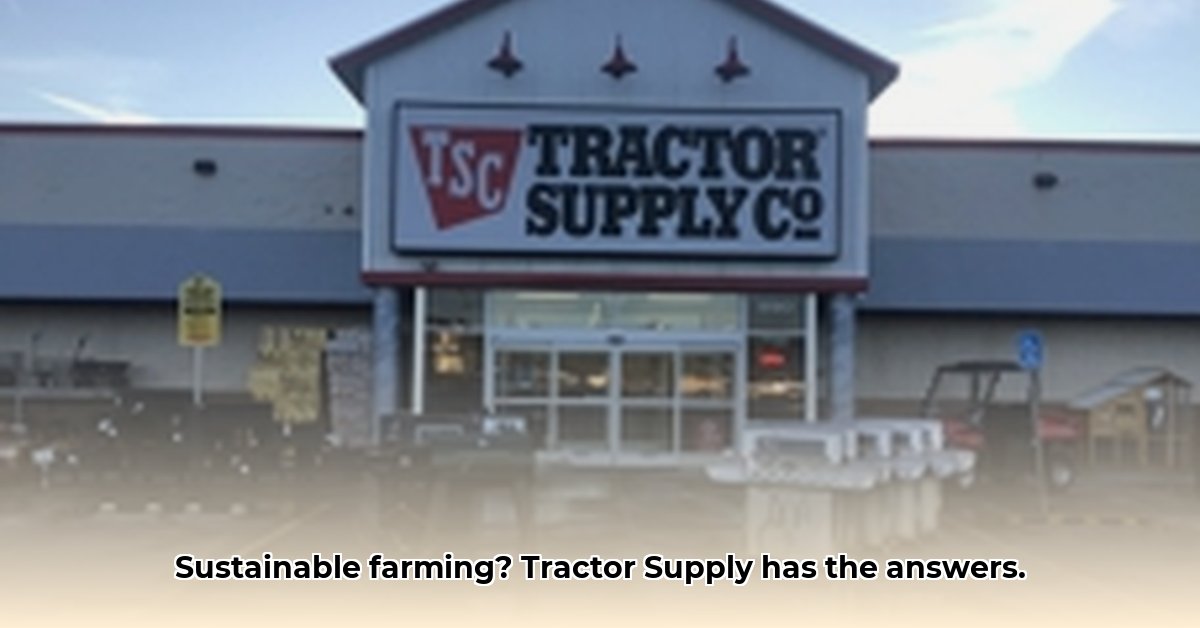
Tractor Supply (TSC) in Belen, New Mexico, presents a compelling case study: How can a large retailer contribute to the advancement of sustainable agricultural practices in a specific region? This article analyzes TSC's potential role, acknowledging both its contributions and limitations in supporting sustainable farming in New Mexico. We examine product offerings, analyze TSC's impact on local farmers, and propose actionable steps toward a more sustainable future. For ideas on building raised beds, check out this helpful resource: Raised Bed Gardening.
TSC's Belen Offering: A Closer Look at Product Sustainability
TSC's Belen store offers a wide variety of products relevant to agriculture. These include seeds for diverse crops, water-efficient irrigation tools, and various livestock feeds. However, a critical observation emerges: the store lacks explicit labeling identifying "sustainable" products. This lack of transparency makes it difficult for customers—farmers in particular—to make informed purchasing decisions based on ecological impact. Further research is needed to assess the overall environmental footprint of the products offered, encompassing both product manufacturing and transportation to the store.
How can consumers effectively identify truly sustainable options without clear labeling? This lack of transparency necessitates a deeper dive into product sourcing, manufacturing processes, and packaging materials. A data-driven analysis of product life cycles would be beneficial.
TSC and Sustainable Agriculture: A Nuanced Relationship
The presence of sustainable products alone does not automatically translate to sustainable farming practices. The effectiveness hinges upon how farmers utilize these resources. Are they adopting water-wise irrigation techniques? Are soil health best practices being implemented? These on-the-ground practices are crucial determinants of the overall environmental impact. TSC provides the tools; the farmers ultimately determine their application.
Dr. Maria Garcia, Agricultural Extension Specialist, New Mexico State University, notes: "Sustainable agriculture is a holistic process. Access to resources is important, but successful implementation requires knowledge, technical expertise, and often, financial resources as well." This emphasizes the need to go beyond simply supplying products.
Stakeholder Perspectives & Collaborative Approaches
Sustainable agriculture demands collaboration. New Mexico farmers rely on TSC for essential supplies, making it a central hub in the agricultural supply chain. The state government can play a vital role by offering incentives for adopting sustainable practices. Finally, consumers can influence product demand through their purchasing decisions.
What role might government incentives play in encouraging farmers to adopt sustainable practices? Data illustrating the direct impact of governmental support would be revealing. Could tax breaks incentivize the adoption of more sustainable farming techniques?
Actionable Steps Toward a Greener Future
Implementing sustainable agriculture requires a multi-faceted approach. The following steps, categorized by stakeholder, offer a pathway towards improvement:
- Tractor Supply: Conduct customer surveys to understand needs and preferences regarding sustainable products. Develop a comprehensive sustainability report detailing supply chain transparency and environmental impact.
- New Mexico Farmers: Actively seek out workshops and training on sustainable farming techniques and methods. Explore options to source supplies more responsibly, considering the entire life-cycle of materials.
- New Mexico Government: Offer financial incentives, including grants and tax breaks, to farmers adopting sustainable practices. Fund research on local sustainable techniques and their economic feasibility.
- Consumers: Actively seek out sustainable products and businesses. Support local farmers committed to environmentally responsible practices.
Unanswered Questions and Future Research
While TSC potentially supports sustainable agriculture, comprehensively assessing its impact requires additional data. Crucial questions remain:
- What proportion of TSC's inventory constitutes genuinely sustainable products?
- What are the adoption rates of sustainable practices among local New Mexico farmers who source from TSC?
- How do the prices of sustainable products compare to conventional alternatives, and what is the accessibility of those sustainably-sourced resources?
- What are the long-term economic consequences of adopting more sustainable agricultural practices for farmers?
Further investigation into these aspects will provide a clearer understanding of TSC's actual contribution to sustainable agriculture in Belen, New Mexico. This ongoing research and collaboration are crucial for a future where sustainable farming flourishes.